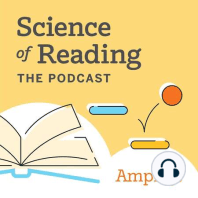13 min listen

S7 E03: When not to differentiate: A guide to small-group instruction with Jamey Peavler
S7 E03: When not to differentiate: A guide to small-group instruction with Jamey Peavler
ratings:
Length:
36 minutes
Released:
May 3, 2023
Format:
Podcast episode
Description
This season is all about tackling the hard stuff, and there is no harder pill to swallow than being told by a student that you don't know how to teach reading—especially when you realize they're right! After this happened to Jamey Peavler, Co-Director in the Reading Science Graduate Program at Mount St. Joseph University, she leaned in and took the opportunity to completely rethink her approach to literacy instruction. Now, her research focuses on maximizing small-group instruction. In this episode, she'll share her findings and her advice, as well as some best practices for small-group instruction and balancing small- and whole-group work.Show notes:Book: Explicit Instruction: Effective and Efficient Teaching by Anita L. Archer and Charles A. HughesGraphic: Instructional Hierarchy: Matching Interventions to Student Learning Stage (Haring, et al., 1978)Webinar: Maximizing the Benefits of Small-Group Instruction with Jamey PeavlerBook: 10 Success Factors for Literacy Intervention: Getting Results with MTSS in Elementary Schools by Susan L. HallQuotes:“We have this mindset of that small-group differentiated golden standard, but there's a certain amount of instruction, again, [that] all kids need and there isn't a lot of difference between those things.” —Jamey Peavler“There's a certain amount of proactive, preventative foundation-building work that should be done for all kids. We can do that more efficiently in a whole-group setting and then reserve that small-group setting for what truly needs to be differentiated, because not everything has to be differentiated.” —Jamey Peavler“If we can set aside the idea of introducing a new program, and instead focus our core instruction on how that language and how those routines could actually be intensified in that small-group setting, we're going to minimize that cognitive overload.” —Jamey Peavler“What we know about overlearning is when you get that fluency down and that generalization down, you are more likely to accurately reach adaptation sooner. So it's not causing harm for the kids who have already learned that skill.” —Jamey Peavler“When you mess up, it's okay. Just mess up again tomorrow in a different way.” —Jamey Peavler
Released:
May 3, 2023
Format:
Podcast episode
Titles in the series (100)
S1-00. About Science of Reading: The Podcast by Science of Reading: The Podcast